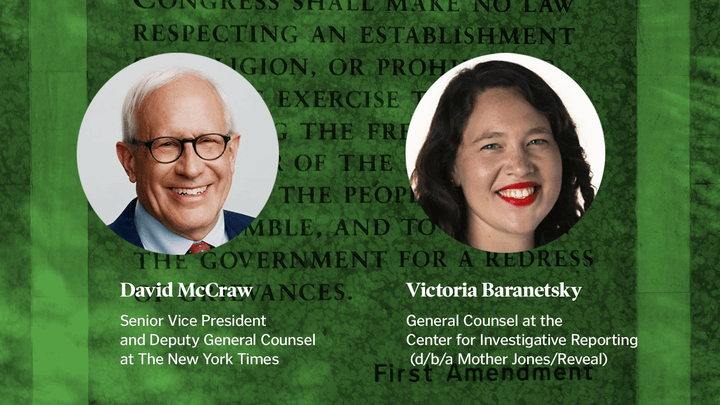This week I was fortunate enough to talk to some outstanding students from the Investigative Reporting Center at the UC-Berkeley Graduate School of Journalism. I was maybe a little too excited to find that two of them Zoomed in from Oklahoma City, where they were working on a story — I went full Oklahomer on them, talking about the thrift store they should check out and my experiences as a young journalist covering the Oklahoma City bombing.
I interviewed them about their work on the PBS “Frontline” documentary “American Insurrection,” a collaboration with ProPublica and their school. You can read my full story for Poynter here.
I was also lucky enough to talk to the program’s director, David Barstow, a four-time Pulitzer Prize winner. I asked him if it was tough to go from being a star reporter at The New York Times to a behind-the-scenes mentor and coach.
“It was always a thrill when you heard the magic words, ‘Your story is going to be on Page One tomorrow,’” Barstow said. “But I will also tell you that I have never felt more of a thrill than when Marc Lacey, the national editor at The New York Times, told me last year that two of my students were gonna get on Page One of The New York Times. … Nothing’s ever made me as excited as that.”
I can relate to that thrill we get when our students succeed. Of course for me it was thrilling for a student to get a byline in the sports section of The Oklahoman, or even the Stillwater NewsPress.
And I stand by that unique thrill! Yes, there are bigger, better-resourced schools and programs out there than the one you might be teaching or advising at. But I found the students I talked to this week to be humble, tenacious and grateful for the opportunities they’ve worked hard for, and I pushed them to tell me what journalism students from around the country could learn from their experiences with a prominent journalist like Barstow. I hope their answers inspire you and your students.
College Media Project deadline is this weekend!
If you haven’t already done so, please encourage your students to apply for Poynter’s College Media Project, which will set them up with Poynter resources, mentorship and a $1,500 grant to execute a project they want to tackle. We will pick five student media outlets to work with this fall to complete a one-semester project.
Here’s a sampling of what some of our schools did this year, just to inspire your newsroom’s application:
- Morgan State University: Black Health Matters (Poynter story: Student journalists at Morgan State University launch ‘Black Health Matters’ to cover health disparities)
- University of Richmond: The Westham Project (Poynter story: These student journalists are investigating a slavery burial ground on their college campus
- USC’s Equity Board
One more Poynter plug
I’m excited about this free webinar happening Thursday at noon Eastern: Diverse Voices and the Future Newsroom. “In this 45-minute session, you will explore how the ongoing racial reckoning in newsrooms will impact the future of journalism.”
I’d really love to see some younger journalists show up and give us the scoop from their college newsrooms.
Teachapalooza is coming!
OK one more Poynter plug. There are tuition discounts for Teachapalooza (June 4-5 virtually at Poynter) for certain of you out there!
- Texas educators: The Headliners Foundation of Texas is pleased to support your attendance of Virtual Teachapalooza this year. Go to this link and register with the promo code 21TXHFTeacha100 to secure your seat.
- We have grant funding to cover the tuition of 50 HBCU professors, or educators at predominantly Hispanic-serving or Indigenous-serving institutions. Sign up here and use the promo code 21LmnScpTeacha100.
Please register ASAP to take advantage of these offers. If you need assistance, please email info@poynter.org and our crack teaching team will help.
News for LGBTQ student journalists
I got this last week from The Association of LGBTQ Journalists, which recently announced their inaugural Student Conference. “This virtual gathering will take place from June 25-26 and will feature opportunities for students to learn from industry experts, connect with fellow student journalists, and explore the intersections of the media world and LGBTQ identities. Sessions will feature discussions on topics such as self-expression in the workplace, the history of LGBTQ journalism and how to start one’s own publication. Students will have the opportunity to connect with recruiters from top news organizations at the Internship & Career Fair.”
Register here (it’s free for NLGJA members). Students who are not members can apply here for a free student membership, which comes with a complimentary registration for both the student conference and the 2021 national convention.
How many people are you letting in?
It’s graduation season. It might be interesting to compare school guidelines on capacity for graduation ceremonies to those of the sporting events. The president of Siena College in New York has been vocal about troubling inconsistencies. (I’m handing you these story ideas with a grain of salt. I know it’s finals season and everyone is probably more worried about finishing the year than planning late investigations. But maybe there’s some life left in the old gray matter yet!)
Title IX news
Have you checked out Poynter’s free Title IX explanatory course? It was created by my friend Sarah Brown, a reporter at The Chronicle of Higher Education. As a subscriber, I get their great newsletter each weekday morning. This passage from a recent issue jumped out at me about Sarah’s story, “Tensions Over Campus Sexual Assault Roil U. of Arkansas.”
Amid a fresh wave of national attention on campus sexual assault, accusations are swirling at the University of Arkansas at Fayetteville, where the Title IX coordinator has resigned, and student leaders say the administration has repeatedly failed to support victims.
What’s happening at Arkansas is one example of the Title IX debates gaining traction at colleges nationwide — including concerns about how Title IX offices treat students who report sexual misconduct, and the consequences of the divisive regulations put in place by the former Education Secretary Betsy DeVos.
Campus outrage at Arkansas reached a peak last week, when Gillian Gullett, a 2020 graduate, found out that the university had paid a $20,000 settlement to the student she had accused of sexually assaulting her. According to a university letter included with the settlement, the student might not have been punished because of the new, stringent disciplinary mandates — like cross-examination at a live hearing — required by the Trump administration’s Title IX rules.
This just shows how important it is for student journalists to understand how campus sexual assault reporting works, and its many shortcomings.
I’m not rude. I’m doing my job.
I thought this was great advice from Poynter Senior Vice President and NPR Public Editor Kelly McBride, who wrote in her newsletter last week that listeners sometimes mistake “direct and succinct journalism” for rudeness.
In response to a reader’s question, she wrote:
While journalists are often most effective when they mix respect with expertise, politeness doesn’t get you far. That’s because polite behavior is often at odds with challenging the power structure.
We’ve noticed another subtle trend when listeners are objecting to the way a journalist questions a powerful person. More often, it’s a female journalist that offends sensibilities with her pointed questions. This isn’t universal. But (when) ‘Morning Edition’ host Rachel Martin was interviewing former President George W. Bush, we wondered if the objection would be the same had her co-host Steve Inskeep asked the same questions.
You can read the entire piece here, or you can just internalize the lesson for your students: Being a journalist sometimes means playing tough, and there’s no shame in that.
Diverse headlines
One valuable way that you can reinforce diversity, equity and inclusion in your classroom is by sharing journalism about, by and for diverse communities — not just stories that are predominantly by and about cisgender white people. Here are a few examples I saw this week.
- On Updating Trans Journalists’ Bylines (Trans Journalists Association)
- How one student newsroom built an ‘Equity Board’ to diversify and improve its coverage (Poynter)
- Historic Colorado KKK membership documents, newly published, show white supremacy was rampant in 1920s Denver (Denverite)
College headlines
- College softball coaches decry treatment by NCAA: ‘What’s lower than an afterthought?’ (Washington Post)
- SGA senator sworn in wearing ‘white lives matter’ mask was arrested in 2015 for threatening to attack courthouse (The Sunflower, Wichita State)
Great journalism to share with your students
- The Island Is Idyllic. As a Workplace, It’s Toxic. (text, The New York Times)
- ‘Floyd was my man. But George Floyd is a movement.’ The private grief of Courteney Ross, George Floyd’s girlfriend (text, The Washington Post)
- How Pfizer Makes Its Covid-19 Vaccine (visuals and text, The New York Times)
Poynter’s Internship Database
The Associated Press is seeking “an imaginative and inquisitive digital storyteller to intern with the global investigations team, applying modern storytelling techniques to bring ambitious, impactful stories to life for digital audiences.”
This 10-week remote internship is funded by the Ida B. Wells Society, a journalism organization established to increase the presence of reporters, editors and visual journalists in investigative reporting. Special consideration will be given to students who come from underrepresented communities, HBCUs and other minority-serving institutions.
To apply, send a cover letter, resume and three clips/samples to idabwellssociety@unc.edu with the subject line “Associated Press-IBWS Summer Internship.”
Deadline is 5 p.m. Eastern, May 14.
Information about this and other internships can be found here.
The Lead
This week, in light of The New York Times’ decision to eliminate the term “op-ed,” we asked, “Student newsrooms, are you explaining opinion content to your readers?”
Subscribe to Poynter’s student journalism newsletter, The Lead, here, and encourage your students to do the same.
This week’s Professor’s Press Pass
A friend of mine who’s a student speech advocate and expert changed his Facebook profile pic this week to read “Save the Cheerleader, Save the World” in reference to the oh-so-significant student free speech case that made its way to the Supreme Court last week. In this week’s Professor’s Press Pass, we ask students to consider what they should and shouldn’t be allowed to say on social media, especially when they’re not at school.
One last thing
Here’s an evocative Twitter thread for those of us in education who love a good magazine cover.
Resources for Journalists
- College Media Project: Apply today to be one of five independent student media publications in this semester-long accelerator program — Deadline to apply: May 2!
- United Facts of America: A Festival of Fact-checking with special guest Dr. Anthony Fauci — Join us May 10-13
- Get access to a growing library of case studies — Professor’s Press Pass
- Understanding Title IX — Create unique reporting around your school’s cases and institutional practices — Start anytime







